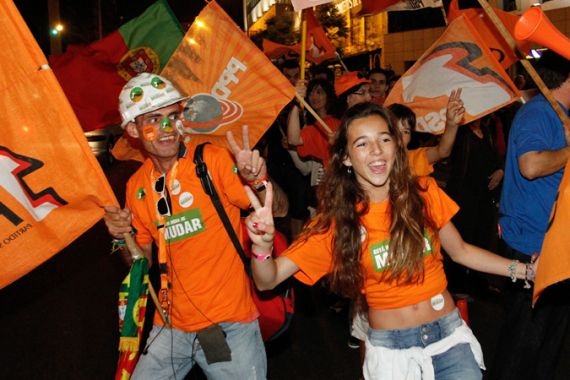Opposition wins Portugal election
Social Democrat leader vows to do “everything possible” to honour bailout commitments after defeating ruling Socialists.

Portugal’s centre-right Social Democrats (PSD) have won the country’s general election, defeating prime minister Jose Socrates’ Socialists who had sought a $114bn bailout that will bring deep spending cuts.
The PSD captured 38.6 per cent of Sunday’s vote against 28 per cent for the Socialists, the interior ministry said after only the results of votes cast abroad were left to count.
The result leaves the PSD short of a majority but party leader Pedro Passos Coelho said he would immediately seek to form a coalition government with the conservative CDS-PP party which won 11.7 per cent of the vote.
The parties are expected to work fast on Monday to form a majority. Paulo Portas, the CDS-PP leader, has said he is ready to rule together with the Social Democrats.
In his victory speech, Passos Coelho vowed that Lisbon will do “everything possible” to honour its bailout commitments so as “not to be a burden” to its creditors.
“I want to guarantee to those who are watching us from abroad that Portugal does not intend to be a burden for the future to other countries that lent us the means that we needed today to face up to our responsibilities,” he said.
The bailout is conditional on measures that include tax hikes, a freeze on state pensions and salaries and a reduction in unemployment benefits as well as their duration.
“The years ahead are going to require much courage on the part of all of Portugal. This is going to be difficult but it is going to be worth it,” Passos Coelho said.
‘New political cycle’
Outgoing prime minister Socrates quit the leadership of the Socialist Party after conceding defeat.
“This defeat is entirely mine and I want to assume full responsibility for it,” he said in an address to party supporters in Lisbon.
|
“Given the economic and financial situation in the country, I consider this election the most important since the first ballots after April 25 [1974]” Jose Manuel Barroso, European Commission president |
“I feel it is necessary to open a new political cycle that is able to prepare a consistent alternative. I want to give the Socialist Party the space to discuss its future and select a new leadership.”
The election ends a period of political uncertainty that started with the collapse of the Socialist government in March and led Lisbon to become the third country in the euro zone to seek a bailout after Greece and Ireland.
The Portuguese, who face the highest level of unemployment in their country for three decades, had been expected to reject caretaker Prime Minister Socrates because of the dire state of the economy.
Many voters said they were disillusioned with politics. “Seeing the economic and political situation in the country I just don’t believe any of the candidates. But not voting will make it even worse,” Jose Evora, a retiree voting at the outskirts of Lisbon, said.
Ricardo, a voter in his late 20s, expressed a common view, that any new government will have to march to the beat of the lenders’ drum.
“I think the election won’t bring anything new because it’s the IMF in charge of the country now … Any party that gets to the government will just have to follow IMF rules,” he said.
‘Kickstart the economy’
Jacob Funk Kirkegaard of the Peterson Institute for International Economics told Al Jazeera that the PSD had campaigned on a platform of “a lot of pain” and rapid implementation of the IMF austerity programme.
“But it’s worth remembering that in many ways, Portugal has been in a state of hibernation ever since they joined the euro,” he said.
“They grew extremely slowly even before the economic crisis began in 2008. So in many ways this programme represents the best chance Portugal has had for generations to actually kickstart its economy again and get some economic growth.”
A centre-right government would be welcomed by investors, who have lost faith in the country in the past few months, dumping its bonds and sending borrowing rates to euro-era highs.
Jose Manuel Barroso, the European Commission president who is Portuguese and voted in Lisbon, said the election was the most important since the turbulent ballots after the overthrow of the country’s fascist dictatorship in April 1974.
“Given the economic and financial situation in the country, I consider this election the most important since the first ballots after April 25,” he said.
A centre-right coalition government should be able quickly to enact reforms and austerity measures included in the bailout to reduce Portugal’s large deficit and debt.
But the economy is expected to contract two per cent both this year and next, presenting the new government with tough challenges as disposable incomes fall and austerity takes its toll.
So far there have been few strikes or protests against the austerity, unlike in Greece and neighbouring Spain, but analysts say that could change as the recession deepens.